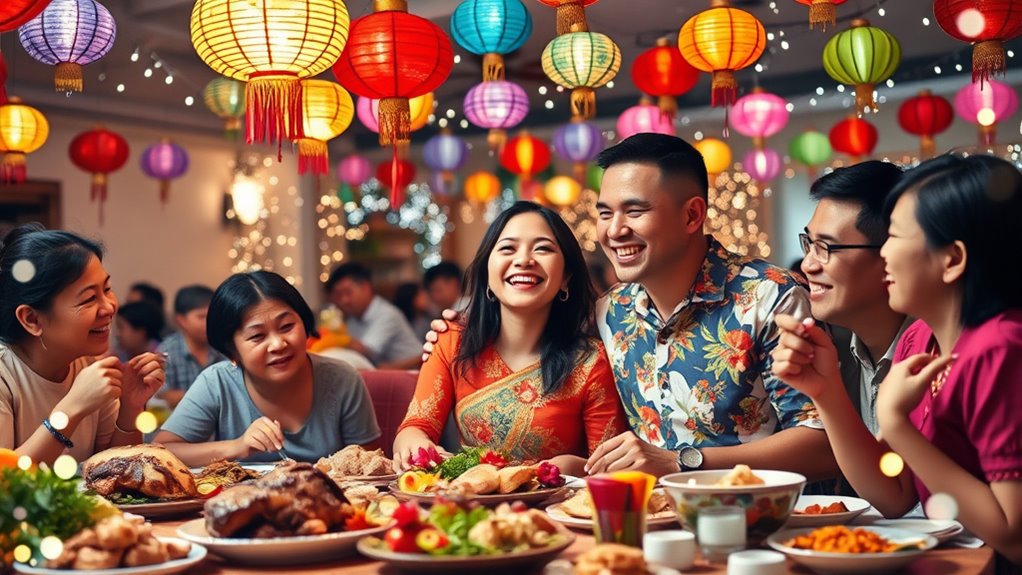To celebrate Filipino holidays with your Filipina spouse, focus on family bonding and traditions. Enjoy festive meals like Noche Buena on Christmas Eve and participate in local rituals such as Lenten practices during Holy Week. Engage in community events, attend mass, and embrace Filipino customs like *págmamáno* for blessings. Incorporate traditional foods, vibrant decorations, and lively music to create a joyous atmosphere. There’s so much more to explore in the rich tapestry of Filipino celebrations!
Key Takeaways
- Embrace family gatherings by joining her relatives for holiday meals, reinforcing the importance of family in Filipino culture.
- Participate in traditional practices like *pagmamano* to show respect and strengthen your bond with her family.
- Celebrate Christmas by attending *Simbang Gabi* and preparing a festive Noche Buena feast together.
- Engage in local festivities, such as neighborhood fiestas, to connect with the community and share cultural experiences.
- Observe significant holidays like Eid’l Fitr and Araw ng Kagitingan to appreciate the traditions and values important to her heritage.
Understanding the Importance of Family in Filipino Celebrations
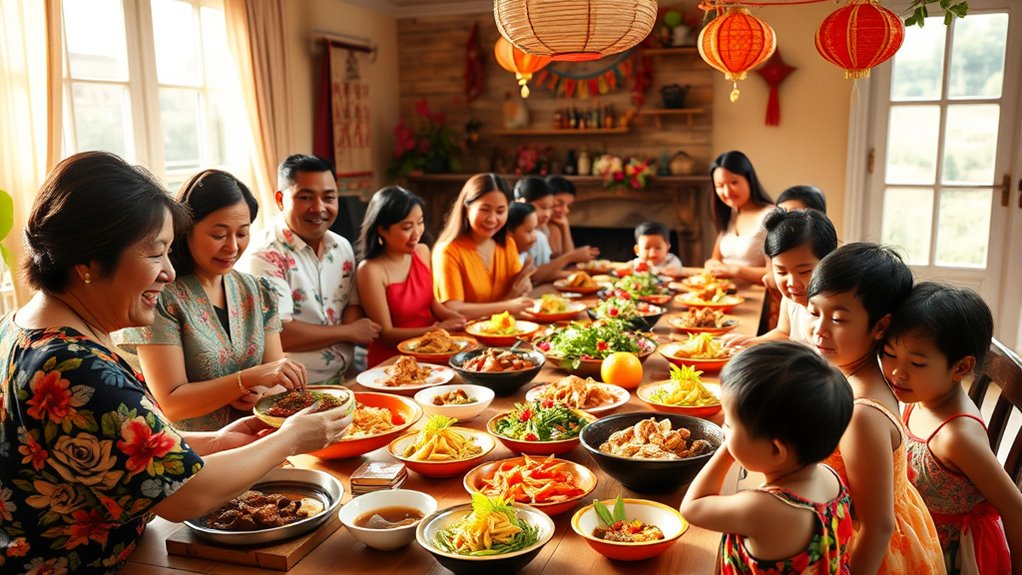
When you celebrate Filipino holidays, you’ll quickly notice that family is at the heart of every gathering. These celebrations reinforce bonds through shared activities and cherished traditions.
You’ll find that neighborhood fiestas promote connections across generations, helping everyone feel involved. Practices like *pagmamano* highlight respect for elders, showcasing the value Filipinos place on family hierarchy.
During these events, families rely on one another for support, creating a sense of interdependence that deepens relationships. You’ll also witness the passing of ancestral wisdom, as traditions are shared from one generation to the next.
Engaging in traditional activities, enjoying festive foods, and participating in religious practices all enhance your family’s unity and connection, making these celebrations truly special.
Exploring Key Filipino Holidays in 2025
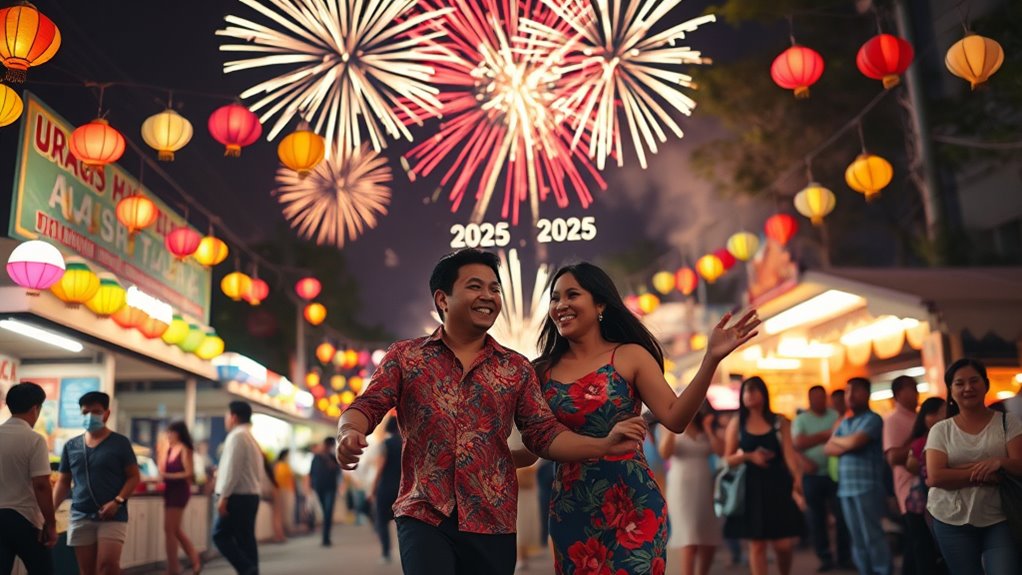
As you prepare to celebrate Filipino holidays in 2025, you’ll find that each occasion brings its own unique significance and traditions.
New Year’s Day kicks off the year with fireworks and joyful family gatherings.
On April 1, Eid’l Fitr marks the end of Ramadan, a time for reflection and gratitude.
Just days later, on April 9, Araw ng Kagitingan honors the bravery of Filipinos during World War II.
Labor Day on May 1 celebrates workers’ rights, while Independence Day on June 12 commemorates the country’s freedom from Spain.
Each holiday offers a chance to bond with family, enjoy traditional foods like *tikoy* and *biko*, and immerse yourself in vibrant music and dance, creating unforgettable memories together.
Embracing Traditions During Holy Week
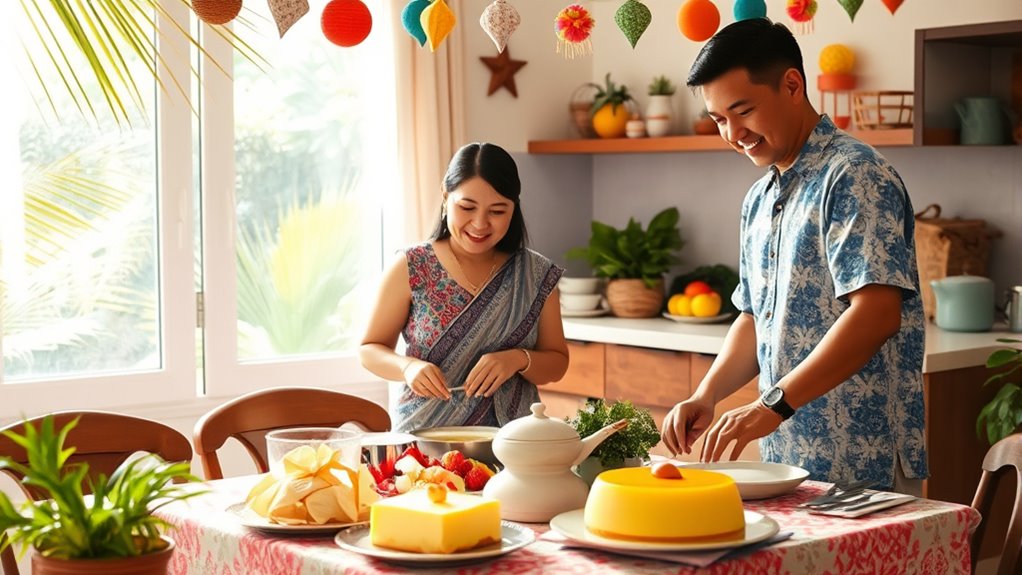
Celebrating Holy Week offers a profound opportunity to connect with your Filipina spouse’s cultural and spiritual heritage. Engage in cherished traditions like Palaspas, blessing and displaying woven palm fronds at home for protection.
Celebrate Holy Week to deepen your bond with your Filipina spouse through meaningful traditions like Palaspas.
Participate in the Pabasa ng Pasyon, reading verses reflecting Christ’s sufferings, and take part in Visita Iglesia, visiting seven churches to meditate on Jesus’ crucifixion.
On Good Friday, enjoy the Senakulo, local passion plays that share His story. Consider fasting together to deepen your reflection.
Join in the joyful Salubong on Easter Sunday, celebrating Jesus’ resurrection.
Making Christmas Special With Unique Traditions
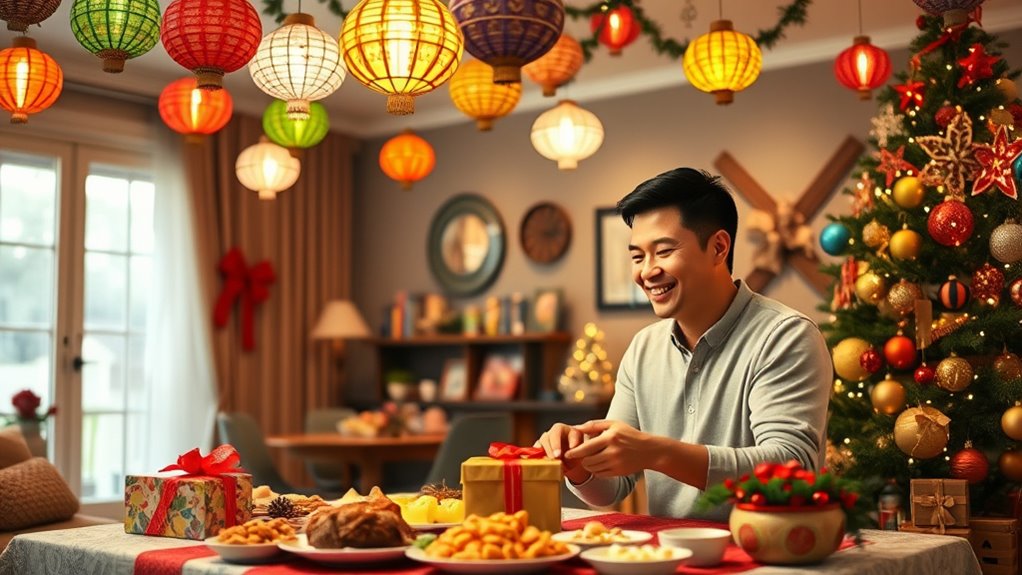
To make Christmas truly special with your Filipina spouse, immerse yourselves in the unique traditions that define this joyous season.
Start by attending Simbang Gabi, a series of nine early morning masses from December 16 to Christmas Eve. This communal celebration strengthens bonds and carries spiritual significance.
Decorate your home with parols and vibrant lights, adding to the festive atmosphere. Enjoy traditional foods like bibingka, puto bumbong, and a grand Noche Buena feast on Christmas Eve.
Embrace family gatherings by practicing the Págmamáno tradition, where younger members seek blessings from elders.
Finally, participate in local celebrations, reconnecting with relatives and friends to share in the warmth and joy of the season. Sharing these experiences fosters a strong partnership that celebrates love and tradition.
Celebrating New Year’s Eve With Filipino Customs
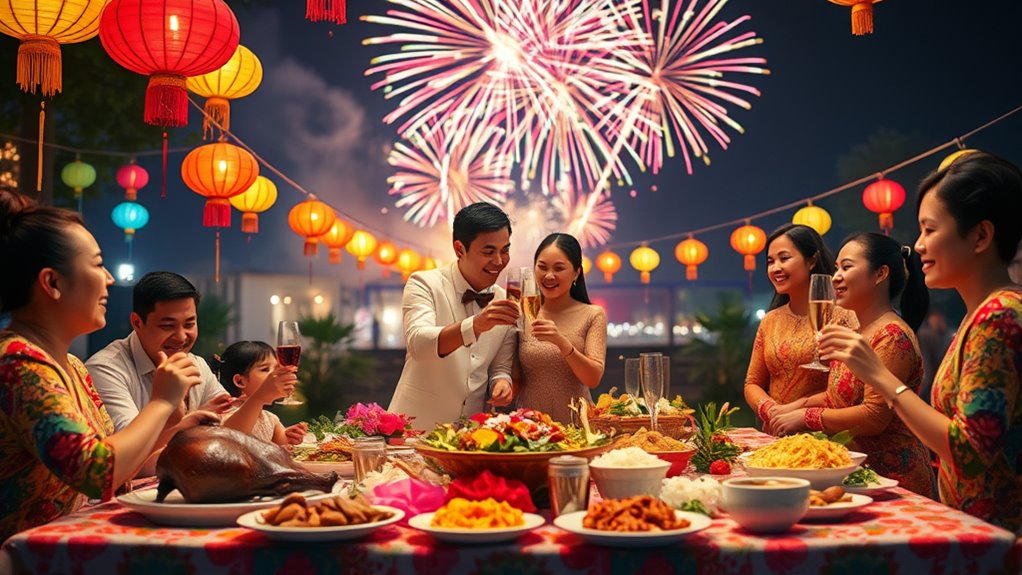
After the warmth and joy of Christmas, New Year’s Eve brings another wave of celebration filled with vibrant Filipino customs.
You’ll want to prepare a feast called Media Noche, symbolizing prosperity, featuring traditional dishes like lechon and pancit.
Encourage everyone to wear polka dots, as they’re believed to attract wealth.
As midnight strikes, join in the noise-making traditions—banging pots or blowing horns helps ward off evil spirits.
Jumping is a fun activity for kids, promoting growth, while displaying 12 round fruits invites prosperity.
Open doors and windows at midnight to welcome positive energy.
Embrace the festive atmosphere with family, music, and dancing, creating a joyful environment for the New Year ahead.
Incorporating Traditional Filipino Foods Into Your Celebrations
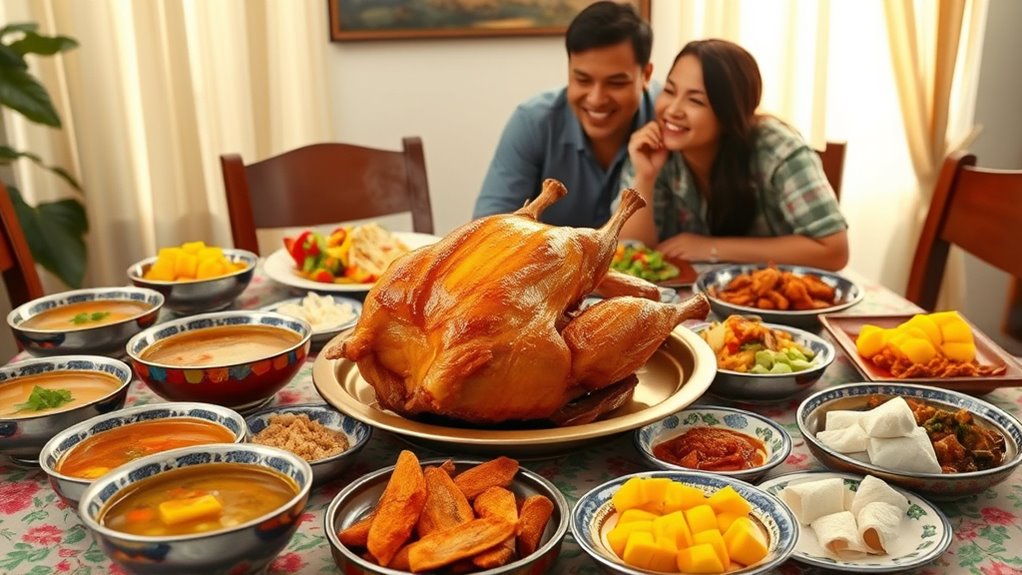
Incorporating traditional Filipino foods into your celebrations not only enhances the festive atmosphere but also strengthens cultural bonds. Serve pancit, symbolizing long life, alongside adobo for a savory kick.
Enhance your celebrations with traditional Filipino foods like pancit and adobo to strengthen cultural bonds and create a festive atmosphere.
Don’t forget sinigang, with its tangy broth, to warm the heart. For larger gatherings, a lechon will surely impress as the centerpiece, especially during Christmas.
Complement your feast with hamon or queso de bola. Desserts like bibingka and ube halaya will bring sweet joy to the occasion.
You can also host potlucks, encouraging friends to share their own Filipino dishes. Cooking together as a family passes down recipes and stories, making your celebrations richer and more meaningful.
Enjoy the flavors that connect you to your spouse’s heritage!
Engaging in Community Activities and Festivals
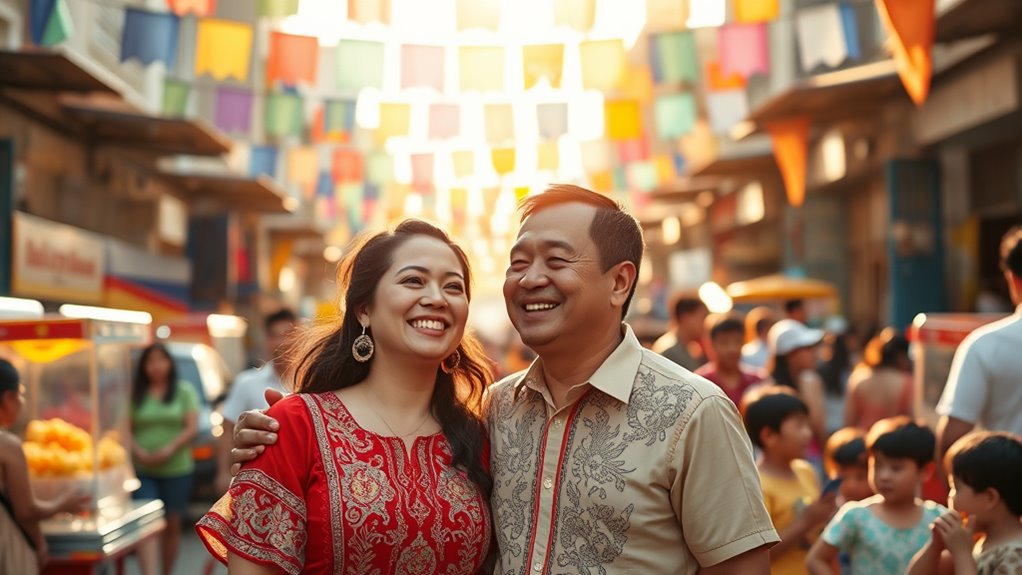
While celebrating Filipino holidays with your Filipina spouse, engaging in community activities and festivals enriches the experience and deepens your connection to her culture.
Participate in local festivals like the Kuyamis Festival in Cagayan de Oro or the Sarakiki Festival in Calbayog City, where you can enjoy street dancing and vibrant celebrations.
Attend Filipino community events such as Kamayan Night or Misa de Gallo, immersing yourselves in traditions. Support local artisans at community bazaars or watch martial arts demonstrations, showcasing Filipino heritage.
Join group singing during Christmas caroling or participate in grand parades, fostering community spirit.
These activities not only honor her culture but also create lasting memories and strengthen your bond together.
Strengthening Your Relationship Through Cultural Exchange
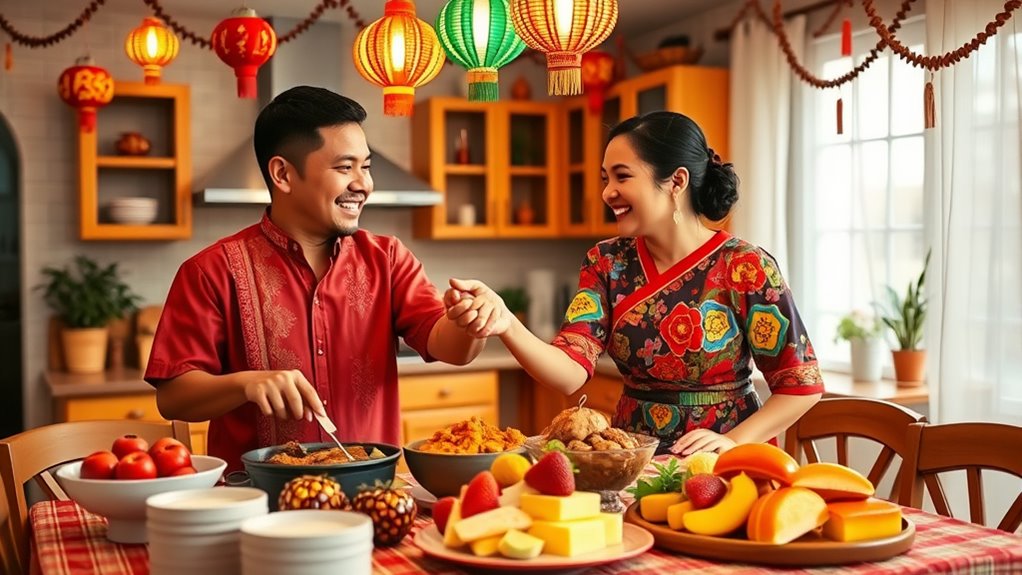
Cultural exchange can considerably strengthen your relationship with your Filipina spouse, as it fosters deeper understanding and appreciation of each other’s backgrounds.
Engage in Filipino holiday traditions, like attending Simbang Gabi or hosting a Noche Buena feast, to create shared memories. Respect and participate in cultural practices, such as making parols or exchanging gifts during Monito Monita, to show your commitment.
Incorporating Filipino elements into your daily life, like cooking traditional dishes or learning basic Filipino phrases, helps you connect with her family and community.
Prioritize family gatherings during celebrations to enhance bonds. By embracing these cultural experiences, you nurture your relationship and create a warm, inclusive environment that honors both your backgrounds.
Frequently Asked Questions
What Are Some Common Filipino Superstitions During Holidays?
During holidays, you’ll encounter various Filipino superstitions. For instance, rain on a wedding day is seen as a sign of good fortune.
On New Year’s Eve, you might wear polka-dotted clothes for luck and enjoy long noodles, like pancit, to symbolize longevity.
You’ll also notice families lighting candles on All Saints’ Day to guide lost souls.
Avoid sleeping with your feet facing the door, as it’s believed to invite misfortune.
How Can I Learn Traditional Filipino Songs for Celebrations?
Learning traditional Filipino songs can feel like diving into a vibrant tapestry of culture and history.
Start by exploring streaming platforms for iconic tracks, then enhance your skills through karaoke sessions.
Join community events to experience the music live, and consider local music schools for hands-on practice.
Don’t forget to use language learning apps to grasp the lyrics better.
Each song you learn weaves you deeper into the rich Filipino heritage.
What Gifts Are Appropriate for Filipino Holidays?
When choosing gifts for Filipino holidays, think about local food treats like bibingka or puto bumbong that can evoke nostalgia.
Handcrafted items, such as parol lanterns, showcase cultural heritage.
Personalized gifts, like customized barong or photo albums, add a special touch.
Sustainable gifts like potted plants and reusable items are appreciated too.
Are There Specific Attire Suggestions for Filipino Holiday Celebrations?
For Filipino holiday celebrations, consider wearing traditional attire to honor the culture.
Men often don a Barong Tagalog, while women can choose a Baro’t Saya, which exudes elegance.
You might also accessorize with a Lihin-Lihin scarf or an Alampay wrap to elevate your look.
Modern takes on these garments can add a fresh twist, allowing you to express your personal style while celebrating the rich Filipino heritage.
How Can We Involve Children in Filipino Holiday Traditions?
Imagine a garden where every flower tells a story. You can cultivate this garden by involving your children in Filipino holiday traditions.
Let them create DIY parols, help prepare bibingka, or join you in neighborhood caroling.
Encourage them to learn about Noche Buena feasts and the significance of Aguinaldo.
Conclusion
Celebrating Filipino holidays with your Filipina spouse is like weaving a vibrant tapestry, each thread representing a cherished tradition, memory, and shared love. As you embrace these customs, you’re not just honoring her heritage but also strengthening your bond. Together, you’ll create a beautiful mosaic of experiences that reflects both your cultures. Let each celebration be a colorful brushstroke on the canvas of your relationship, reminding you that love grows richer when you honor each other’s roots.
